Filter by
Ariconium, Herefordshire An Iron Age settlement and Romano-British 'small town'
The Roman 'small town' of Ariconium in southern Herefordshire has long been known as an important iron production center but has remained very poorly understood. The town is suggested to have developed from a late Iron Age Dobunnic tribal center, which owed its evident status and wide range of contacts to control of the production and distribution of Forest of Dean iron. Rapid expansion during …
- Edition
- -
- ISBN/ISSN
- 9781842179352
- Collation
- -
- Series Title
- -
- Call Number
- -

The Archaeology of The Upper City and Adjacent Suburbs
This volume contains reports on sites excavated in the upper walled city at Lincoln and adjacent suburbs between 1972 and 1987. The project included large-scale excavations which yielded some stunning finds and revealed considerable information about several periods of the city's history. Each site is described in turn, incorporating stratigraphic, artifactual and environmental information, and…
- Edition
- -
- ISBN/ISSN
- 9781782979043
- Collation
- -
- Series Title
- -
- Call Number
- -
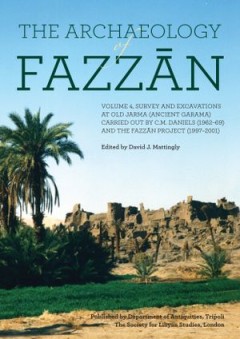
The Archaeology of Fazzan, Volume 4 Survey and Excavations at Old Jarma (Anc…
This is the concluding volume of the Archaeology of Fazzān series, bringing to press the combined results of two Anglo-Libyan projects in southern Libya: the pioneering work of Charles Daniels between 1958 and 1977 and the Fazzān Project directed by David Mattingly between 1997 and 2001. The investigations carried out by these two projects allow an entirely new reconstruction and understandin…
- Edition
- -
- ISBN/ISSN
- 9781914268076
- Collation
- -
- Series Title
- -
- Call Number
- -
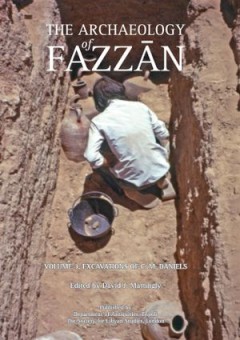
The Archaeology of Fazzan, Volume 3 Excavations of C. M. Daniels
The Archaeology of Fazzan is a major series of reports on the archaeology and history of Libya’s south-west desert region. This volume contains reports and analysis on a series of excavations carried out between 1958 and 1977 by the British archaeologist Charles Daniels, lavishly illustrated by site plans and numerous colour photographs – particularly of the rich artefact assemblages recove…
- Edition
- -
- ISBN/ISSN
- 9781914268069
- Collation
- -
- Series Title
- -
- Call Number
- -

Archaeology in the PPG16 Era Investigations in England 1990–2010
The Archaeological Investigations Project (AIP), funded by English Heritage, systematically collected information about the nature and outcomes of more than 80,000 archaeological projects undertaken between 1990 and 2010. This volume looks at the long-term trends in archaeological investigation and reporting, places this work within wider social, political, and professional contexts, and review…
- Edition
- -
- ISBN/ISSN
- 9781789251111
- Collation
- -
- Series Title
- -
- Call Number
- -
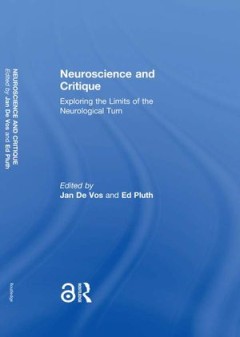
Neuroscience and Critique Exploring the Limits of the Neurological Turn
Recent years have seen a rapid growth in neuroscientific research, and an expansion beyond basic research to incorporate elements of the arts, humanities and social sciences. It has been suggested that the neurosciences will bring about major transformations in the understanding of ourselves, our culture and our society. In academia one finds debates within psychology, philosophy and literature…
- Edition
- -
- ISBN/ISSN
- 1317500245
- Collation
- -
- Series Title
- -
- Call Number
- -

The Archaeology of Fazzan, Volume 2 Site Gazetteer, Pottery and other Survey…
The Archaeology of Fazzan, volume II, Site Gazetteer, Pottery and other Survey Finds, Edited by David J. Mattingly “The Libyan Sahara is one of the richest desert areas for the study of human adaptation to changing environmental and climatic conditions. This is the second volume in a projected series of four reports detailing the combined results of two Anglo-Libyan projects in Fazzan, Libya�…
- Edition
- -
- ISBN/ISSN
- 9781914268052
- Collation
- -
- Series Title
- -
- Call Number
- -
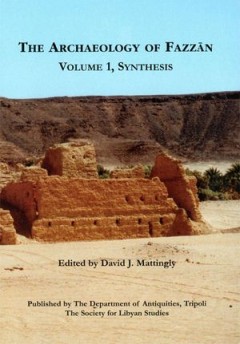
The Archaeology of Fazzan, Volume 1 Synthesis
This book seeks to advance knowledge of human settlement and adaptation in the world's largest desert, the sahara. Previous studies focussed on the prehistoric phases but this study takes a wider historical and geographical perspective. It sets out to combine the results of several field campaigns, their histories and methodologies. We look at fieldwork, fortifications, funerary structures, irr…
- Edition
- -
- ISBN/ISSN
- 9781914268045
- Collation
- -
- Series Title
- -
- Call Number
- -
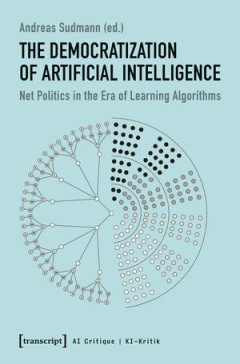
The Democratization of Artificial Intelligence Net Politics in the Era of Le…
After a long time of neglect, Artificial Intelligence is once again at the center of most of our political, economic, and socio-cultural debates. Recent advances in the field of Artifical Neural Networks have led to a renaissance of dystopian and utopian speculations on an AI-rendered future. Algorithmic technologies are deployed for identifying potential terrorists through vast surveillance ne…
- Edition
- -
- ISBN/ISSN
- 9783837647198, 9783839447192
- Collation
- -
- Series Title
- -
- Call Number
- -
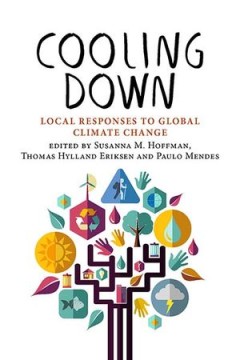
Cooling Down: Local Responses to Global Climate Change
Climate change is a slowly advancing crisis sweeping over the planet and affecting different habitats in strikingly diverse ways. While nations have signed treaties and implemented policies, most actual climate change assessments, adaptations, and countermeasures take place at the local level. People are responding by adjusting their practices, livelihoods, and cultures, protesting and migratin…
- Edition
- -
- ISBN/ISSN
- 9781800731899
- Collation
- -
- Series Title
- -
- Call Number
- 301 COO c
 Computer Science, Information & General Works
Computer Science, Information & General Works  Philosophy & Psychology
Philosophy & Psychology  Religion
Religion  Social Sciences
Social Sciences  Language
Language  Pure Science
Pure Science  Applied Sciences
Applied Sciences  Art & Recreation
Art & Recreation  Literature
Literature  History & Geography
History & Geography